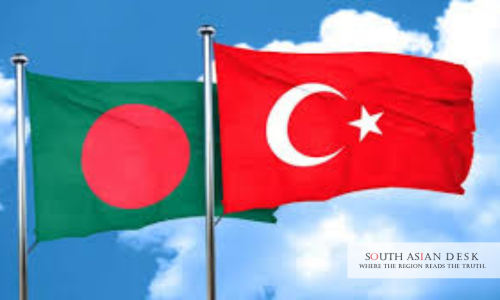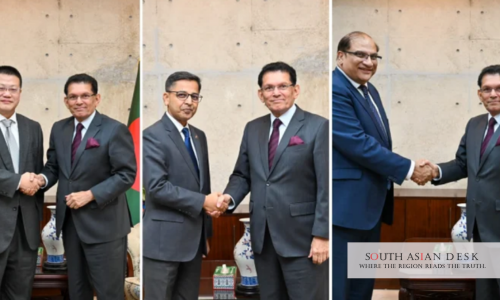Bangladesh Investment Development Authority (BIDA) dispatched a senior team to Istanbul on October 7, 2025, to secure Bangladesh-Turkiye investments from Turkiye. The mission, led by Executive Chairman Chowdhury Ashik Mahmud Bin Harun, addresses who, what, when, where, why and how of expanding bilateral economic links.
It responds to Bangladesh‘s post-LDC graduation needs by tapping Turkiye’s expertise in technology transfer and joint ventures. The initiative unfolds amid 2024 trade volumes exceeding $1 billion, with Turkish foreign direct investment (FDI) at $220 million and rising.
This development signals Bangladesh’s pivot towards high-value partnerships in South Asia. As the region grapples with supply chain shifts and energy transitions, closer Bangladesh Turkiye economic partnership sectors could inject $3 billion in trade potential. It aids Dhaka’s diversification from garment exports, fostering resilience against global volatility. For neighbours like India and Pakistan, it sets a model for intra-regional investment flows, potentially easing LDC transition pressures across the subcontinent.
High-Level Delegation Targets Turkiye Investors
The BIDA-led group arrived in Turkiye to hold government-to-business meetings with major conglomerates on October 7 and 8. Supported by the International Finance Corporation (IFC), the visit includes workshops on FDI best practices. Participants reviewed regulatory reforms and digital tools to streamline approvals.
Chowdhury Ashik Mahmud Bin Harun emphasised the shift in Bangladesh’s appeal. “The world is taking notice of Bangladesh’s transformation,” he stated during an interview in Istanbul. “Our objective goes beyond attracting investment. We aim to build long-term strategic partnerships. With Turkiye’s strong industrial ecosystem and global presence, there is tremendous potential for co-investment, technology transfer, and joint ventures that drive shared growth for both nations.”
The delegation met officials from Invest in Turkiye, the host’s national promotion agency. Discussions covered investor aftercare and policy alignment. Existing Turkish firms, including Koç Holding and Aygaz, joined to highlight success stories. Aygaz recently expanded its liquefied petroleum gas operations in Chattogram, while Coca-Cola Içecek acquired a local beverages unit.
Nahian Rahman Rochi, BIDA’s head of business development, noted the strategic fit. “New Turkish companies would explore what our strategic location and growing ecosystem have to offer,” he said. “This mission could promote meaningful partnerships and practical lessons which strengthen BIDA’s institutional capacity.”
These engagements build on bilateral momentum. In July 2025 alone, Bangladesh exported $47 million worth of goods to Turkiye, up 2.67% from the prior year. Turkiye’s exports to Bangladesh reached $48.1 million that month, a 116% jump. Annual figures for 2024 stood at $428 million from Turkiye to Bangladesh, per United Nations data.
Bangladesh Turkiye Economic Partnership Sectors in Focus
Talks spotlighted 10 priority areas for Bangladesh eyes Turkiye investment. These span manufacturing to emerging tech, aligning with Dhaka’s industrial upgrade goals.
Priority Sectors for Collaboration
Textiles lead as Bangladesh’s export mainstay, valued at $581 million to Turkiye in 2023-24. Joint ventures could introduce high-value apparel and leather processing. Energy follows, with Turkiye’s green technology expertise aiding Bangladesh’s renewable push. Officials discussed power generation and logistics hubs.
Processed foods and fast-moving consumer goods (FMCG) offer quick wins. Turkiye’s packaged exports could pair with local production for regional markets. Information and communications technology (ICT) emerges as a growth driver, targeting software parks and digital services.
Logistics and construction round out infrastructure needs. Turkiye’s port expertise could enhance Chattogram’s capacity. Healthcare investments include equipment manufacturing, building on Turkiye’s field hospital support in Rohingya camps. Consumer electronics and retail complete the list, with potential for assembly plants.
Defence stands apart. Bangladesh seeks small-scale collaborations in communications systems and precision parts. Proposals include a dedicated military economic zone near Dhaka. “Turkiye’s expanding defence and technology sectors present opportunities for co-investment and technology transfer,” Harun added.
These Bangladesh Turkiye economic partnership sectors reflect shared priorities. Turkiye imports jute, knitwear and leather from Bangladesh, while exporting iron, steel and cotton. The 2019 volume hit $936 million; current goals aim for $3 billion by 2030.
During the 4th foreign ministry-level consultations in Dhaka on October 8, Bangladesh Foreign Secretary Asad Alam Siam and Turkiye’s Deputy Minister A Berris Ekinci reviewed progress. They pledged to convene the next Joint Economic Commission soon. Bangladesh invited more Turkish inflows, citing LDC graduation challenges. Sectors like energy, health and defence featured prominently.
Background: Evolving Bilateral Ties
Relations date to 1971 independence recognition by Turkiye. Early focus centred on humanitarian aid, including Rohingya support. Trade formalised via a 1980 agreement, evolving into the 2010 framework for economic cooperation.
Key milestones include President Recep Tayyip Erdogan’s 2010 visit and Sheikh Hasina’s 2012 trip to Ankara. In 2020, Ambassador Mustafa O. Turan met BIDA’s Md. Sirazul Islam to explore zones and hospitals. Trade Minister Ömer Bolat’s January 2025 Dhaka visit urged factory relocations.
BIDA’s official portal underscores potential in IT, light engineering and tourism. Pharmaceuticals and agriculture add layers, with Erdogan’s September 2020 call for diversification. Asia Anew Initiative bolsters ties, positioning Bangladesh as a hub.
Current FDI totals $220 million, with 50 Turkish firms operating. Growth in exports underscores viability. Bangladesh’s youthful workforce complements Turkiye’s tech prowess.
What’s Next for Bangladesh-Turkiye Investment
The Istanbul seminar on October 9 caps the visit. Co-hosted by BIDA and Dhaka’s embassy, it features sector briefings and networking. Turkish leaders will hear pitches on ease-of-doing-business reforms.
Longer-term, a preferential trade agreement looms. Defence pacts could materialise via training exchanges. Energy deals may secure green imports. As Bangladesh navigates LDC exit in 2026, these steps fortify supply chains.
Bangladesh eyes Turkiye investment as a cornerstone of its 2041 vision for upper-middle-income status. With aligned ambitions, the duo could redefine South Asian trade dynamics.
Published in SouthAsianDesk, October 8th, 2025
Follow SouthAsianDesk on X, Instagram, and Facebook for insights on business and current affairs from across South Asia.






